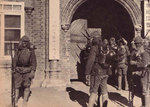Battle of Harbin and Establishment of Manchukuo
Contributor: C. Peter Chen
ww2dbaseBy Jan 1932, the Japanese had established military control over northeastern China (Manchuria). To appease the Chinese population, the Japanese established a number of collaborationist regime in the area to nominally govern the region, one of which being the Jilin Army under General Xi Qia. Meanwhile, defeated at Qiqihar and driven out of the provinces of Heilongjiang and Nenjiang, China, General Ma Zhanshan continued to resist. Japanese Colonel Kenji Doihara attempted to persuade Ma to cease his resistance and join the Japanese. Not meeting success, Doihara ordered Xi Qia to attack Ma's forces based at the city of Hailun; it was Doihara's wish to use Japanese troops as little as possible to limit the appearance of Japanese aggression. En route, Xi Qia's forces was attacked by the combined forces of Ma and General Ding Chao on 25 Jan 1932, causing serious casualties. On 28 Jan, Ding captured the city of Harbin, taking it from a pro-Japanese Chinese general. The Japanese 4th Brigade attempted to take Harbin, but the extremely cold temperatures made maneuvers difficult. It was not until 4 Feb that the Japanese troops closed in on Harbin. As the Japanese attacked, a well-coordinated aerial bombardment broke the morale of Ding's troops. Ding ordered a general retreat before the end of the day, taking his troops down the Songhua River toward the northeast. Ding's forces was effectively wiped out after this defeat.
ww2dbaseWith Ding neutralized, Doihara once again asked Ma to give up, offering a large sum of money as incentive. Ma did so on 14 Feb, and was rewarded by the Japanese by being able to retain his provincial governorship of Heilongjiang. On 27 Feb, Ding formally surrendered as well. The surrender of Ma and Ding marked the end of resistance in northeast China.
ww2dbaseEpilogue
ww2dbaseWith organized resistance effectively wiped out, on 18 Feb 1932, the Japanese established the puppet state of Manchukuo ("The Manchu State") in northeastern China. The former Emperor of China (deposed 20 years prior), Puyi, was installed as its Chief Executive. The city of Changchun, renamed Xinjing, was the capital of Puyi's new nation that few nations in the world recognized outside of the later Axis powers and nations of the Soviet Union (which had a non-aggression treaty with Japan through 1945). On 25 Mar 1933, in addition to condemning Japan for hostilities in Shanghai, the League of Nations refused to recognize Manchukuo as a legitimate government. As a result, Japanese delegates walked out of the League of Nations. In 1934, Puyi was declared Emperor Kangde of Manchukuo. Despite the grand title, he would remain a puppet of the Japanese until the end of the war in 1945.
ww2dbaseSource: Wikipedia.
Last Major Update: Sep 2012
Battle of Harbin and Establishment of Manchukuo Interactive Map
Photographs
 |  |  |  |
Battle of Harbin and Establishment of Manchukuo Timeline
| 25 Jan 1932 | The forces of Ma Zhanshan and Ding Chao attacked the collaborationist forces of Xi Qia in Heilongjiang Province, China. |
| 28 Jan 1932 | Chinese General Ding Chao's troops captured Harbin, Heilongjiang Province, China from collaborationist forces. |
| 4 Feb 1932 | Japanese troops captured Harbin, Heilongjiang Province, China. |
| 14 Feb 1932 | Chinese General Ma Zhanshan surrendered to the Japanese in Heilongjiang Province, China. |
| 15 Feb 1932 | The local Chinese naval commander in Harbin, Heilongjiang Province, China surrendered his 5 river gunboats to the Japanese. |
| 18 Feb 1932 | Japan established the puppet nation of Manchukuo in northeastern China. |
| 19 Feb 1932 | The League of Nations reviewed the facts regarding the Japanese violation of Chinese sovereignty, but it would fail to result in any action against Japanese aggression. |
| 27 Feb 1932 | Chinese General Ding Chao surrendered to the Japanese in Heilongjiang Province, China. |
| 9 Mar 1932 | Zheng Xiaoxu was named the Prime Minister of the puppet state of Manchukuo. |
| 9 Mar 1932 | Xi Qia was named the Director of Finance of the Japanese-sponsored puppet state of Manchukuo. |
| 9 Mar 1932 | Puyi was inaugurated as the Chief Executive of the puppet state of Manchukuo in northeastern China. |
| 15 Sep 1932 | Ambassador Nobuyoshi Muto and Prime Minister Zheng Xiaoxu signed the Japan-Manchukuo Protocol at the puppet state's capital Xinjing (Changchun, Jilin Province, China). |
Please consider supporting us on Patreon. Even $1 per month will go a long way! Thank you. Please help us spread the word: Stay updated with WW2DB: |

» Puyi
» Xi Qia
» Doihara, Kenji
» Ma, Zhanshan
» Zang, Shiyi
» Zhang, Jinghui
» Zheng, Xiaoxu
Location:
» China
 |
- » 1,182 biographies
- » 337 events
- » 45,119 timeline entries
- » 1,249 ships
- » 350 aircraft models
- » 207 vehicle models
- » 376 weapon models
- » 123 historical documents
- » 261 facilities
- » 470 book reviews
- » 28,415 photos
- » 365 maps
Thomas Dodd, late 1945
Please consider supporting us on Patreon. Even $1 a month will go a long way. Thank you!
Or, please support us by purchasing some WW2DB merchandise at TeeSpring, Thank you!